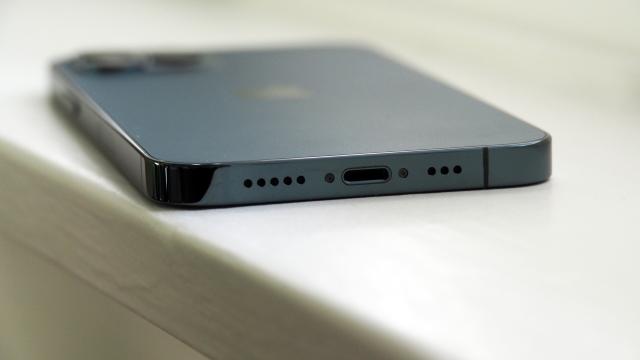Following hot on the heels of leaks from trusted analyst Ming-Chi Kuo that claim Apple will finally be ditching its proprietary Lightning connector for the more widely supported USB-C standard in future iPhones, Bloomberg’s Mark Gurman is adding some credibility of his own to the rumour. Earlier today, he reported that “people with knowledge of the situation” tell him that testing to replace Lightning with USB-C is already underway.
For those tired of juggling dozens of different cables, this is pretty great news. Kuo has said in the past that Apple’s been reluctant to ditch its Lightning connector, which non-Apple devices don’t use, because it’s better for the “MFI business’s profitability” and because it has a higher waterproof specification than USB. But there’s no arguing against the convenience of being able to use the same cable for all of your devices, and Apple is all about convenience.
Let’s not give Apple too much praise for this potential move, though. When Kuo made his initial leak, which was based on a survey amongst his own industry sources, he was doing so shortly after the EU’s Market and Consumer Protection Committee voted in support of legislation that would force companies to adopt USB-C on all small and medium-sized gadgets.
Despite making the Universal Serial Bus port truly universal, this change would also provide those gadgets with the faster transfer and charging speeds that USB-C boasts. USB-C cables, being a newer standard than Lightning, can transfer data at up to 40Gbps, whereas Lightning still tops out around USB 2’s max speed of 480 Mbps. Much of Apple’s ecosystem circumvents this by focusing on downloads, but it’s clear that Lightning is getting a little long in the tooth at this point.
Of course, because much of Apple’s current ecosystem is built on Lightning connectors, the company would also need to create a Lightning to USB-C adaptor for any new, USB-C iPhones or other devices. Bloomberg says this is also in testing. Still, while a swap to USB-C would be a boon to anyone just switching to Apple, it might be a thorn in the side of anyone who’s already deeply bought into the Apple ecosystem. Third-party accessory makers, who create devices such as chargers and car adapters, would also need to redesign their products if the change goes through.
When is iPhone moving to USB-C?
But any changes, according to Bloomberg, wouldn’t occur until “2023 at the earliest.” Note that when we reported on Kuo’s leak, we mentioned the iPhone 15, not the iPhone 14. In other words, don’t hold off on buying Apple gear just because future models might potentially be easier to connect with the rest of your devices. This change is still a long ways off, and is still in the rumour phase.
Overall, though, a move like this would make Apple’s ecosystem more equitable, as does any change away from locking devices down to a proprietary standard. At the same time, Apple could get around the issue by making an entirely portless iPhone that focuses solely on MagSafe charging. However, this would lock out connectivity for some cars, plus potentially slow down charging and data transfer speeds.
Will Apple TV get a price drop?
The iPhone isn’t the only Apple device Kuo’s been making predictions about, by the way. Earlier today, he said that Apple will release “a new version of Apple TV that improves cost structure” in the second half of this year.
The cheapest Apple TV, which tops out at a resolution of 1080p, costs $US150 ($208). The top-of-the-line 4K model starts at $US179 ($248). Meanwhile, a Roku Streaming Stick that supports 4K only costs $US50 ($69). While we don’t know the specifics of Apple’s new “cost structure,” it’s clear that a discount is in order, even if Apple’s offerings have some leeway as premium devices.
